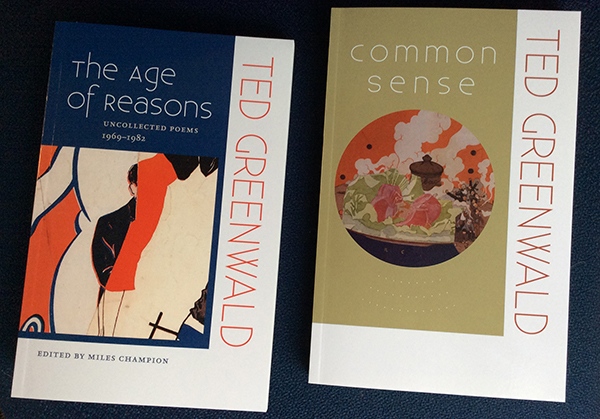It is with sadness that we announce the passing of New York City poet Ted Greenwald (December 19, 1942–June 17, 2016).
Ted Greenwald’s poems sing the commons and dance with a homely grace American poetry has rarely seen.
WHIFF
An evening
Spent talking
Spent thinking
About what my life would be
If I’d stayed
With a particular girl or woman
I went with
What would be
If I’d’ve been accepted to and gone
Where I applied
To a different school
Than the one I did
Where I’d learned
Different social graces
Then the ones I have
Where some of the material
Values of the American dream
Had rubbed off
Enough to make me
Live it out
In the good-works sense
If I’d settled down
And settled
For the foundation
On a house
For future generations
Instead of assuming
Immediately past generations
My foundation to mine
If I’d been
A little quicker to learn
What was expected of me
And wanting to please pleased
Going on that way
Through all eternity
I’ve probably been saved
From mere routines
By a streak of stubbornness
By a slow mind
And tendency to drift
By an emotional development
That requires
My personal understanding
Before happening
Feeling out the implications
An emotion has in
Form of expectation
Before trying out and
After awareness
I sense a willingness
To tell someone
I know and like
And sense the same from
Anything they’d like to know
About me
And, at the same time, have
A vast sense of privacy
Which means
There’s no way
I’ll wear out my personality
And its sense of continuity
Although sometimes
I feel empty
But talking to
Someone I like
And trust
And sense the same from
I feel way up
And after a long evening
Of talk about this and that
Feel wide awake
And feel the world
Wide and awake around me
And have a visual intensity
In memory
That, in near memory, dulls
And throbs
And grows vivid as hell
When I bring it to mind
Some time from then
What my life
Would’ve been like
Under different circumstances
Would’ve been different
With its own
Attendant ifs
And its own what-might’ve-been
But this way
I’ve elected to follow
And cast my vote
Each waking day in
I avoid
The possibility
Of taking the past too seriously
Or feeling any bitterness
Or sadness
This way
When my ship comes in
I’ll’ve passed out of mind
Beyond the sight of land
And won’t hesitate
For a second
To look back on all this
With fondness or remiss
The air’ll be clear
The moon’ll be there
And you, whoever
You are and hope to be,
Will be here with my love
“Is it cynical or is it innocent? He has an almost machinic way. But is it utopian? The most progressive of Ted Greenwald’s poems are just that. No, they all are: forward thinking, Sagittarian, and wildly Americanly kind.” –Eileen Myles

Common Sense
First published in 1978, Common Sense evinces a spare street-wise style rooted in the vernacular of the city. Now something of a cult classic, the book is recognized as an understated masterpiece, pushing at the edges of spoken word. This is the language of everyday, brought onto the page in such a way that we never lose the flow of speech and at the same time we become attuned to its many registers—musical, emotional, ironic. Ted Greenwald’s work has been associated with several major veins of American poetry, including the Language movement and the New York School, but it remains unclassifiable.
The Age of Reasons: Uncollected Poems, 1969–1982
A New York-based poet with close ties to the New York School and the Language poets, Ted Greenwald has written daily since the early 1960s. The Age of Reasons includes the best of Greenwald’s uncollected poetry. While some of these poems appeared in literary journals or magazines in the 1970s, none were included in any of his previously published books. These distinct works were written in advance of or alongside the extended explorations of a mutated triolet form that increasingly occupied him from the late 1970s on. Alongside Common Sense (1978), The Age of Reasons evinces Greenwald’s ability to think with his ear, to hear what’s said as it arrives as a fresh sound or shape in his head. This work is singular in its pattern-making, its music-making, and its ability to simultaneously follow multiple paths.
“No poet has taken the idea that poetry should be at least as good as overheard conversation as seriously as Ted Greenwald.” –Publishers Weekly
“Ted Greenwald knows what real American talk sounds like, understands the rhythm and pulse of the language, and knows how to write poems that are built around that knowledge. He is one of America’s most ambitious and provocative poets.” –Terence Winch, Jacket 19
“Ted Greenwald’s poems ‘give voice’ to a variety of New York idioms, and with that, a distinct attitude toward both language and experience. His ultimate strength as a poet is his basic humanity, something that can be claimed for very few.” –Bill Berkson
“I have called Greenwald an ‘urban primitive’ because his work seems to spring from the base materiality of New York streets, the immediacy of enunciation, abrupt demand, tough neighborhoods, shifting milieus, grit and exhaust, flux and flurry. I see him as a genuine original whose method is a unique exploration of common language, utterly without academic pretense.” –Curtis Faville, publisher, L Publications






